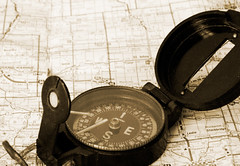
As it has already been said many times during this course we are living in a digital era! Mass media and Internet with their tools seem to make information easily available for all the people, but is it completely true?
When navigating on the net we are assailed by an enormous amount of information and it’s not easy to orientate ourselves! We definitely need a compass to find our way about in this mass!
If we search for something in the net, we’ll see a lot of info matching the topic of our research…But is it everything valid and reliable?
The answer is no!!!
We surely have to think critically about the returns!
As far as I’m concerned, I always try not to waste my time consulting untrustworthy websites and sources…But how do I judge them?! I have to confess that many times I follow my inspiration saying “Ok, this seems to be a useful web site!!” I guess that following my sixth sense it’s not always a good thing and that’s why many times I lose the sense of direction!
During this course Sarah suggested us many tools and strategies to face this problem: Bloglines is one of these, as well as Google advanced research or Del.icio.us.
In the three websites we had to consult for e-tivity 8 there are some interesting criteria for judging the sites, their authority and validity!
First of all we have to know clearly what we want to search otherwise…what are we going to search!?! Opinions, facts, news reports, history!?
Secondly, when on the screen appears the list with the returns we have to look at the URL of the different sites before follow up a link! As a matter of fact, URL can say something about the seriousness of a web site: e.g. if it ends with “edu” it means that the responsible for the information is an educational institution.
Once we have decided which links we want to follow up, we have to check who the responsible for the site or the author is and if the site is regularly updated.
So, to draw a conclusion, we can say that evaluating is something that we need all the time: not only for academic purposes or for our theses but daily in our lives!! The temptation to accept what ever we find is real, but we have to pay attention because everyone can be a potential publisher of Web documents, all we need is an Internet account!
So we have to be critic and clear-headed in order to find what we need!



3 commenti:
Hi Cristina!
I like your idea of the compass: there are surely a lot of information on the Internet and so the most important thing to do is to know how evaluate them. Actually, this isn’t so easy because the Internet is a world continually expanding and modifying… It isn’t like a book, that once it’s written it’s written, but it’s capable of changing daily. This fact creates problems when one tries to judge a source because one must distinguish between reliable and unreliable sources and in continued updates there is the problem of plagiarism. So I think that the most important thing is always think on the author, on the reliability of the websites ( if it’s institutional or not, for example), what kind of document is the one we found etc.
Bye!
Hi Cristina,
I really like your idea of a compass we need when we search for reliale surces on the Web.
We all agee that we have to be critic when we want to search for trustworthy and credible information on the Web.
So,on the one hand, I would undoubtedly agree with those stating that the Web is an unlimited source of information; on the other, I could not forget the hard work the Web pretend from us since it gives us the availability of an enormous quantity of information.
It is really true that everything, also the thing which we always thought to have only positve features, has its positive but also itsnegative side.
Hi Cris!!
Good job!I liked your idea of the compass too! I think it's a good way to represent our need to find a criteria for judging online sources! The Web is like the Ocean and we can't get lost!:-) I found very useful the three webites Sarah sugggested to us; I think that they explain clearly what to do when we want to judge a web site!
Posta un commento